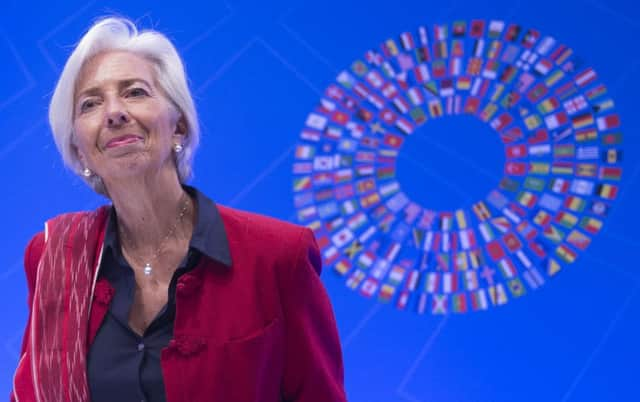Bill Jamieson: Carney's '˜soft patches' strike again


What seemed the near certainty of a rise from the current 0.5 per cent level proved instead to be another month of no change. It’s become an all too familiar pattern: hopes that the economy was strong enough for the Bank to scale down its emergency support of Quantitative Easing confounded by subsequent poor data.
The disappointment this time centred on figures showing the economy grew by just 0.1 per cent in the first three months of the year – the slowest since 2012. Explanations vary – the favourite being the “Beast from the East” bout of severe weather which shut down construction sites, kept shoppers at home and brought transport chaos – though others point to a persistent pattern of weak first quarter numbers that have required subsequent upward revision.
Advertisement
Hide AdAdvertisement
Hide AdFor the moment the bank has described the slowdown as a “temporary soft patch” with “few implications” for prospects. Market analysts now expect an interest rate rise towards the end of the year, followed by another in 2019 and a further one in 2020.
Ah, a “temporary soft patch”! Over the decades chancellors and bank governors have resorted to soothing reassurances of the temporary nature of bad news. Former chancellor Nigel Lawson famously dismissed concern about inflation in the late 1980s as a “temporary blip”.
But Carney has persistent credibility problems. There was the loudly proclaimed commitment made at the time of his appointment in 2012 that he would pursue a policy of “forward guidance”, aiming to reduce business uncertainty over monetary policy and interest rates in particular. And it would help some four million UK households with variable or tracker rate mortgages and 45 million savers: no more Delphic pronouncements that left everyone guessing as to the Bank’s thinking.
This gave rise to high expectations that the new governor – a Canadian chosen from outside the list of domestic candidates and accorded almost rock-star status – would break the insular groupthink and a long tradition of ambiguity and obfuscation.
But this has been followed by frequent forecasting errors and a persistent mis-reading of the UK economy. There were several statements in the 2014 to early 2016 period warning of a rise in interest rates – followed (in the wake of the EU referendum) by a cut. Now a series of indications in the past 12 months have also proved awry.
In all this, the governor deserves some sympathy. The 2007-09 financial crisis took the UK economy into uncharted territory. It was widely thought that record low interest rates and the resort to QE were emergency measures that would prove temporary. But while we avoided recession, the economy sputtered and stuttered, failing to gain a sustained upward momentum. A spike in inflation caused by the pound’s fall confounded matters. A paradox emerged of a most unlikely coincidence: record numbers in work, firms reporting difficulty in recruiting skilled people, but relatively subdued inflation by post-war standards and a growth rate well below its long-term trend.
All the while, changes in data have affected a decision based on fine margins and delicate judgements. But our GDP numbers have come under increasing scrutiny as the internet economy has powered on. Were they really capturing economic activity, or giving rise to misleading figures of poor productivity?
The UK economy, as Andrew Sentance has warned, may now be trapped in a negative feedback loop: persistent low interest rates and uncertainty over their future direction are undermining the pound and hurting consumers by causing inflation. No matter how high you may rise within government and central banking, humility in economic forecasting remains the most difficult wisdom to acquire.
Advertisement
Hide AdAdvertisement
Hide AdCarney declared last week that the “underlying pace of growth remains more resilient than the headline data suggests”. But while it is likely the UK economy should recover from its worryingly weak start this year, it is by no means certain that this can be sustained. The bank has cut its own growth forecast for the year to 1.4 per cent, down from the forecast of 1.8 per cent made in February. And it has pruned back its expectation of growth in average weekly earnings this year from 3 per cent to 2.75 per cent.
Looming uncertainties include the outcome of those tortuous Brexit negotiations and the impact this may have on business and investor confidence; the UK government’s own survival prospects; and now the outbreak of hostilities between Israel and Iran, leading to fears of a Middle East conflagration. This has already worked to drive up the price of oil almost 70 per cent since last summer to $77 a barrel. Westbeck Capital predicts $100 a barrel before long, with $150 quite possible. Such a spike, coming when many are already pointing to evidence of a global slowdown since January, would trigger fears of an international recession.
How ironic it would be if Treasury advertisements for the post of Bank governor appear before an interest rate rise is implemented. Mark Carney is set to step down in June next year. Those who fancy their chances should get polishing that CV – advertisements are expected in the late summer or autumn.
Andrew Bailey, the current head of the Financial Conduct Authority who has spent more than 30 years at the bank, is widely regarded as front-runner. Others fancied include Ben Broadbent, deputy governor for monetary policy, and David Ramsden, chancellor Philip Hammond’s former chief economic adviser.
Other names mentioned include Sharon White, current head of the media regulator Ofcom and former second permanent secretary to the Treasury before 2013; Dave Ramsden, chief economic adviser to the Treasury; former IMF chief economist Raghuram Rajan and no less than the current IMF head and Brexit critic Christine Lagarde. Were her name to go forward, life at the Bank of England and across the policy world would be anything but a temporary “soft patch”.